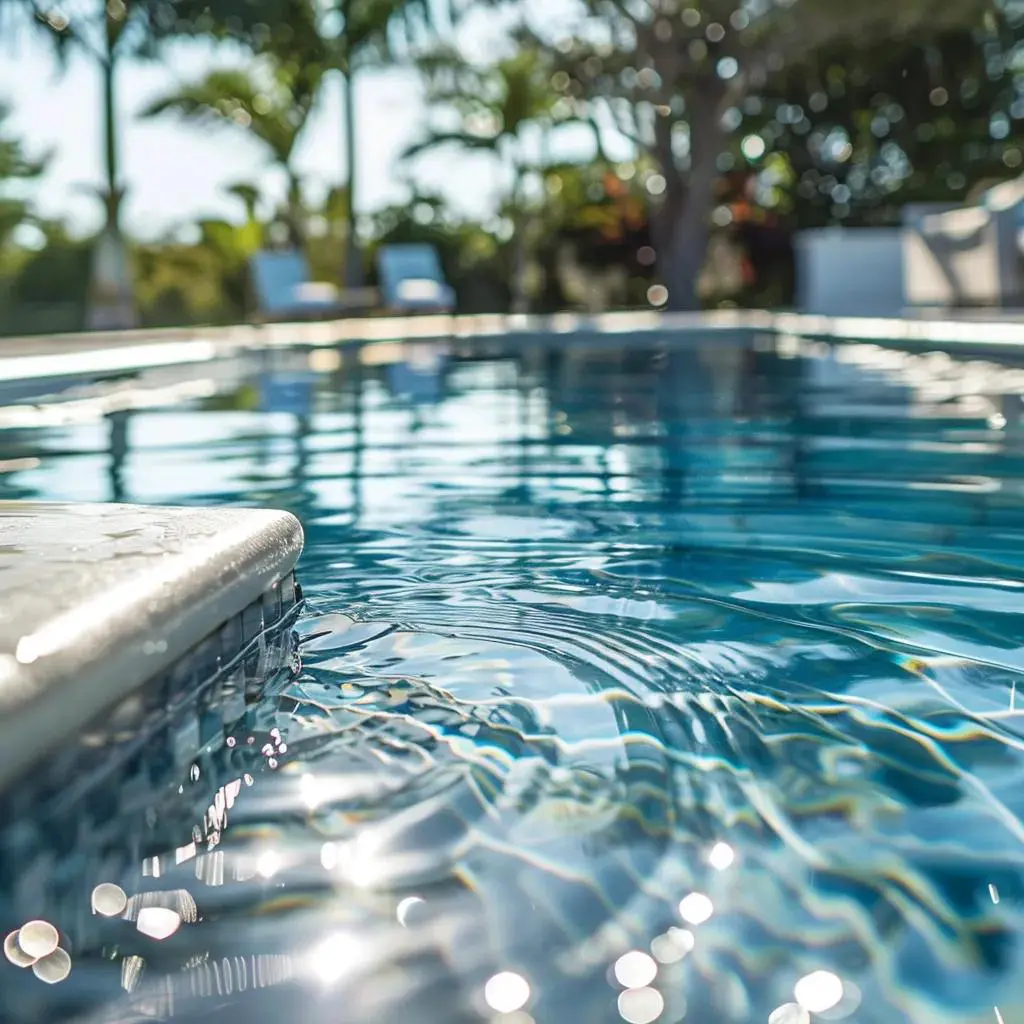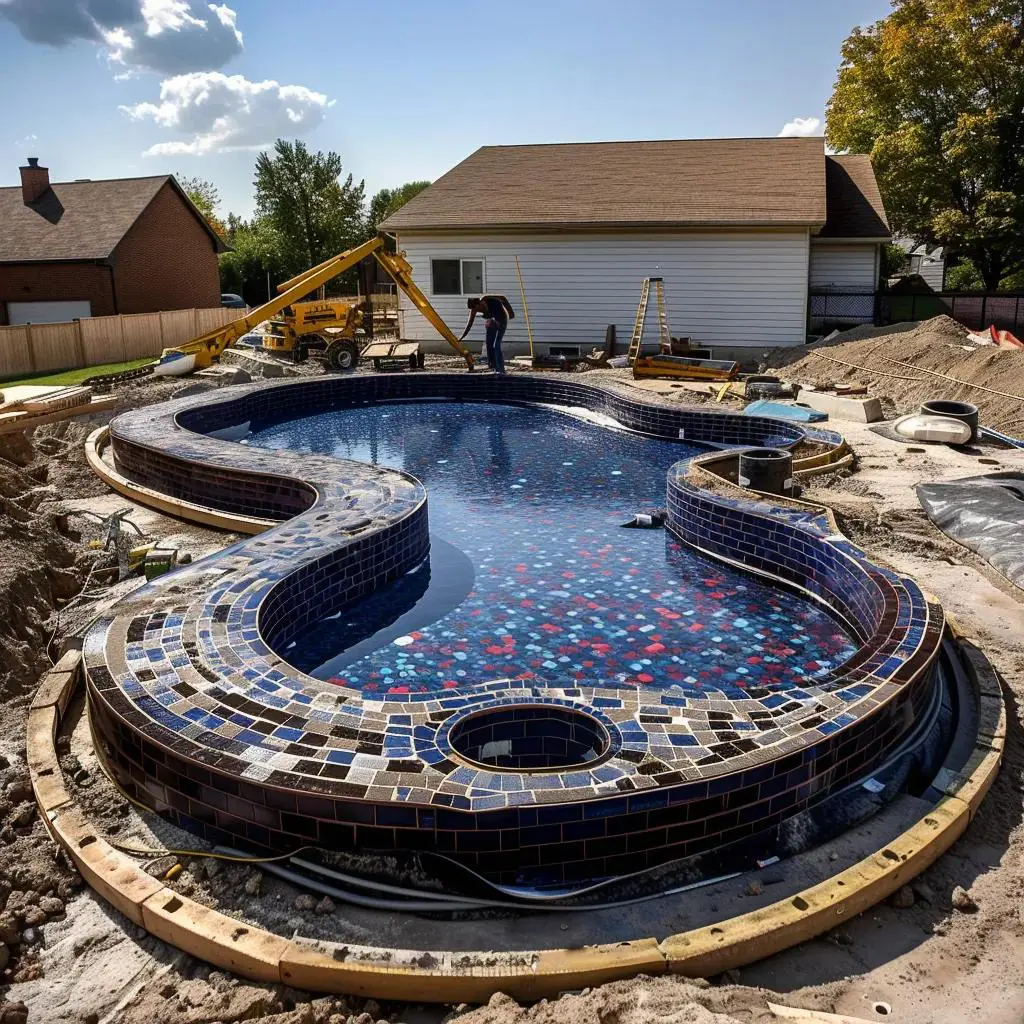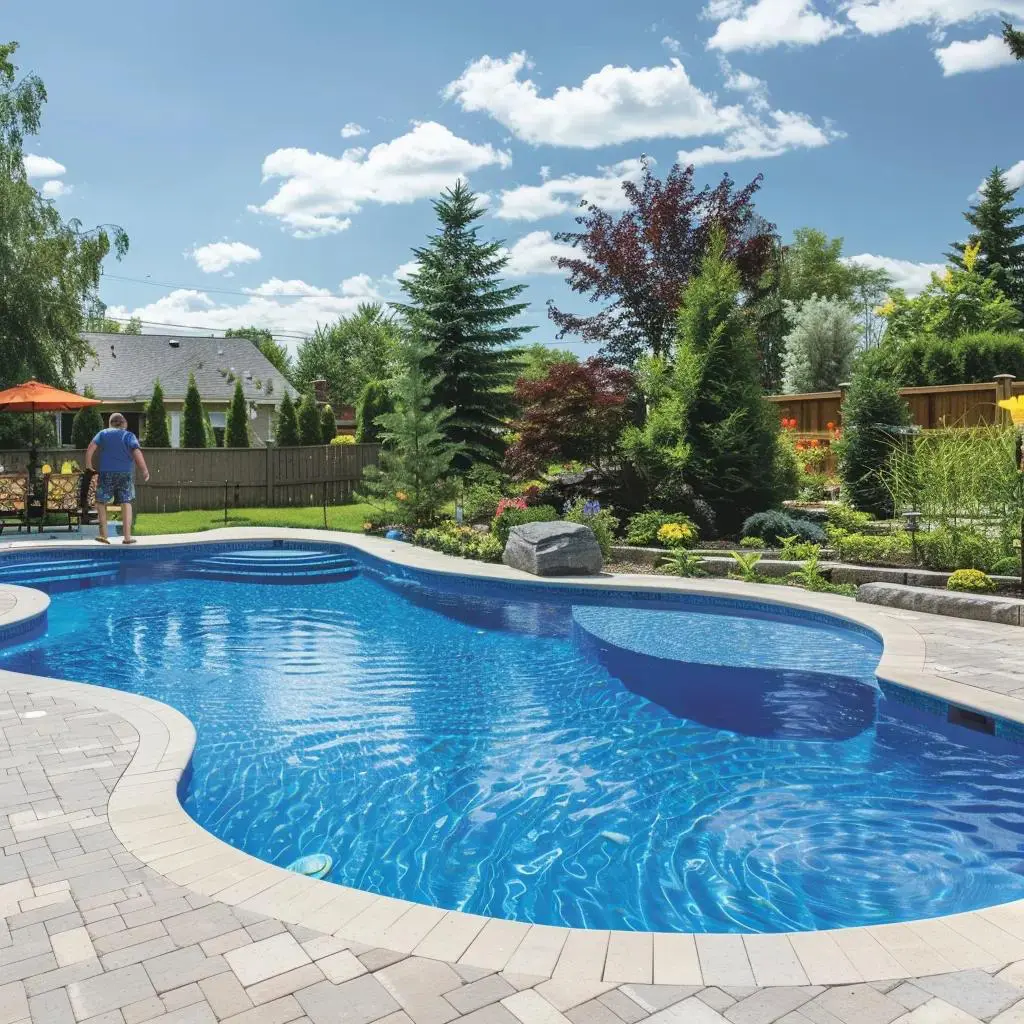Fiberglass vs Vinyl Pools: Best Choice for Wisconsin Homes
Choosing the ideal inground pool material determines not only upfront budget but also decades of enjoyment, maintenance effort and resale value for homeowners in Eau Claire and Western Wisconsin. In this guide, we compare fiberglass pools and vinyl liner pools across five critical themes: core construction differences, cost and long-term value, durability and lifespan, maintenance requirements, and customization options. You’ll also discover regional considerations—like freeze-thaw cycles and local financing—as well as insights into Poolman’s expert installation and service offerings. By mapping each pool type’s attributes to your lifestyle and budget, you’ll be fully equipped to select the right pool for your Wisconsin backyard.
What Are the Key Differences Between Fiberglass and Vinyl Pools?
Fiberglass pools arrive as a pre-manufactured shell molded from a composite of fiberglass and resin. This non-porous gel coat surface reduces algae adhesion and chemical requirements, making upkeep straightforward. In contrast, vinyl liner pools feature a welded steel or polymer frame covered by a replaceable vinyl liner, offering shape flexibility and lower initial investment. Understanding how construction impacts durability, customization and installation timeline will clarify which pool type aligns with your priorities.
How Does Fiberglass Pool Construction Affect Durability and Maintenance?

Fiberglass pool shells consist of layered fiberglass cloth and resin topped with a gel coat finish. This continuous, seamless surface material resists cracking, flexes under ground movement and inhibits algae growth. As a result, a fiberglass pool typically requires fewer chemicals, less brushing and no resurfacing for at least 20 years—boosting long-term durability and minimizing weekly maintenance tasks.
What Makes Vinyl Liner Pools More Customizable and Affordable?

Vinyl liner pools rely on a steel or polymer wall structure to support a flexible vinyl membrane. This modular approach lets installers craft custom shapes and sizes on site, from kidney beans to infinity edges. The liner itself can be printed with tile patterns or pebble textures, creating a designer finish at a fraction of the cost of plaster or gel coat. Lower upfront cost and on-site assembly combine to make vinyl liner pools a budget-friendly, highly adaptable solution for unique landscapes.
How Do Installation Processes and Timelines Compare for Both Pool Types?
Fiberglass pool installation is streamlined: once excavation and base preparation are complete, the shell is craned into place, plumbed, backfilled and decked out in 2–4 weeks. Vinyl liner pools require 3–5 weeks as crews assemble walls, secure coping, weld panels and fit the liner on site. Both types demand careful site grading and plumbing connections, but the off-site manufacturing of fiberglass shells expedites the overall process.
How Do Fiberglass and Vinyl Pools Compare in Cost and Long-Term Value?
Upfront price and lifetime expenses vary widely between fiberglass and vinyl liner pools. While vinyl liner pools start lower, ongoing liner replacements drive up total cost. Fiberglass pools carry higher initial investment but deliver decades of low-maintenance enjoyment without major resurfacing. The table below breaks down key cost attributes:
| Pool Type | Upfront Cost Range | Maintenance Cost (Annual) | Major Service Interval | Lifetime Value Driver |
|---|---|---|---|---|
| Fiberglass Pool | $35,000–$55,000 | $500–$1,000 | Gel coat lasts 25+ yrs | Low chemical use, minimal repairs |
| Vinyl Liner Pool | $25,000–$40,000 | $800–$1,500 | Liner replacement every 5–12 yrs | Liner replacement adds $4,000–$7,500 |
What Is the Upfront Cost Difference Between Fiberglass and Vinyl Pools?
Fiberglass pools typically cost $10,000–$15,000 more than a comparable-sized vinyl liner pool due to factory molding, specialized installation equipment and premium gel coat materials. Vinyl liner pools leverage standardized wall panels and do not require a crane for shell placement, keeping installation labor costs lower.
How Do Maintenance and Liner Replacement Affect Lifetime Costs?
Vinyl liners need replacement every 5–12 years at an average cost of $4,000–$7,500 each time. This cyclical expense can add $20,000–$30,000 over 30 years. In contrast, fiberglass pools rarely need major refinishing; occasional gel coat touch-ups or repairs account for under $2,000 across the same timeframe.
Are There Local Cost Considerations for Pool Installation in Western Wisconsin?
Homeowners in Eau Claire and Western Wisconsin face regional factors such as frost lines, soil composition and local building permits that can influence excavation and permit fees. Cold-climate frost protection may add 10–15% to standard installation costs to ensure pipe insulation and proper base materials.
Which Pool Type Offers Better Durability and Lifespan for Wisconsin Homeowners?
Durability hinges on material resilience to temperature swings, ground movement and chemical exposure. Fiberglass shells flex to accommodate freeze-thaw cycles, while vinyl liners remain vulnerable to tears from sharp objects or excessive chemical imbalances. Understanding each system’s lifespan helps homeowners plan maintenance and replacement schedules.
How Long Do Fiberglass Pools Typically Last and Why?
Fiberglass pools often exceed 25–30 years of service because the pre-manufactured shell resists structural cracks and surface degradation. The non-porous gel coat barrier prevents water absorption and inhibits algae, reducing long-term wear and tear on pool walls.
Pool Construction and Durability
Fiberglass pools are known for their durability, often lasting for several decades due to their construction. The gel coat surface and flexible nature of fiberglass help resist cracking and damage from ground movement and temperature fluctuations, contributing to a longer lifespan compared to other materials.
This supports the article’s claims about the longevity and resilience of fiberglass pools in various environmental conditions.
What Is the Expected Lifespan of Vinyl Pool Liners and Structural Components?
The steel or polymer walls of a vinyl liner pool can last 20–30 years, but the liner itself generally requires replacement every 5–12 years depending on UV exposure, chemical balance and mechanical stress. Timely liner changes prevent leaks and maintain a fresh interior finish.
Vinyl Liner Pool Lifespan and Maintenance
Vinyl liner pools require regular maintenance and have a shorter lifespan compared to fiberglass pools. The vinyl liners are susceptible to damage and typically need replacement every 5-12 years, which can increase the overall cost of ownership.
This citation validates the article’s discussion on the maintenance needs and lifespan of vinyl liner pools.
How Does Local Climate Impact Pool Durability and Maintenance Needs?
Wisconsin’s freeze-thaw cycles place stress on pool shells and plumbing. Fiberglass pools accommodate ground movement thanks to shell flexibility, while vinyl liner pools demand meticulous winterization and careful liner care to avoid cracks or tears when water expands.
What Are the Maintenance Requirements for Fiberglass vs Vinyl Pools?
Both pool types require regular cleaning, filtration and chemical balancing. However, fiberglass pools’ smooth, non-porous surface drastically reduces algae growth and brushing frequency. Vinyl liner pools need careful monitoring of vinyl seams and liner integrity, plus more aggressive chemical treatments to prevent staining and bacterial growth.
Why Are Fiberglass Pools Considered Low Maintenance?
Fiberglass pools resist algae due to the gel coat’s non-porous finish, cutting backwashing frequency and reducing chlorine demand. Routine tasks include weekly skimming, monthly filter cleaning and quarterly chemical tests—far less intensive than liner care.
What Maintenance Challenges Are Common with Vinyl Liner Pools?
Vinyl liner pools require vigilant chemical balance to prevent liner discoloration and calcium deposits. Sharp or abrasive objects can puncture liners, and liner wrinkles can trap debris. Seasonal removals and reinstallations for winterization add labor and risk of seams loosening.
How Do Maintenance Needs Affect Pool Longevity and User Experience?
Lower maintenance translates to more swim time and reduced service calls. Fiberglass pools spend less time offline for repairs or liner changes, enhancing user satisfaction and maintaining water clarity. In contrast, vinyl liner upkeep can interrupt use during liner inspections or replacements.
How Do Customization and Design Options Differ Between Fiberglass and Vinyl Pools?
Customization ranges from shell shapes and built-in features to coping styles and interior finishes. Fiberglass pools come in predetermined models with integrated benches and tanning ledges, while vinyl liner pools can follow virtually any blueprint drawn on site.
What Design Limitations Exist for Fiberglass Pools?
Fiberglass shells are restricted to factory-built molds, limiting shape variety and pool depth options. Features like vanishing edges or complex geometric contours may not be available or require hybrid construction techniques—adding cost.
How Does Vinyl Liner Pool Flexibility Support Custom Shapes and Sizes?
Vinyl liner pools can be excavated to any dimension, with wall panels cut and welded on site to achieve free-form designs, infinity edges or beach entries. This adaptability allows homeowners to tailor pool footprints to irregular yards or integrate multiple deep and shallow zones.
Which Pool Type Is Better for Small Backyards or Unique Outdoor Spaces?
For compact lots or tight fence setbacks, vinyl liner pools’ on-site assembly can squeeze into narrower spaces. Fiberglass shells require crane access and staging clearance, which may complicate installation in confined settings.
What Are the Pros and Cons of Choosing Fiberglass or Vinyl Pools?
Weighing advantages and drawbacks side by side clarifies which pool aligns with your budget, design vision and maintenance tolerance.
What Are the Main Advantages of Fiberglass Pools?
- Exceptional durability under freeze-thaw cycles
- Low chemical consumption and minimal brushing
- Rapid installation in as little as two weeks
- Smooth, non-porous gel coat surface for water clarity
These benefits create a premium ownership experience with fewer interruptions.
What Are the Key Benefits of Vinyl Liner Pools?
- Lower upfront cost and flexible financing options
- Unlimited shape and size possibilities
- Smooth interior finish customizable with printed patterns
- Easy repairs by patching or replacing liner sections
This versatility makes vinyl liner pools ideal for creative backyard layouts on a budget.
What Are the Common Disadvantages of Each Pool Type?
- Fiberglass pools require higher initial investment and limited shell designs.
- Vinyl liner pools demand liner replacements every 5–12 years and careful winterization.
Understanding these trade-offs ensures homeowners select the pool that best matches their priorities.
How Can You Choose the Right Pool for Your Wisconsin Home?
Selecting the optimal pool involves balancing climate resilience, financing availability and lifestyle considerations like family size or pet ownership. Evaluating each factor in the context of your property and budget guides a confident decision.
How Do Climate and Freeze-Thaw Cycles Influence Pool Material Choice?
Materials must withstand shifting soils and cold winters. Fiberglass shells flex with ground movement, while vinyl liners demand winter covers and diligent draining to avoid seam stress. For areas with deep frost lines, fiberglass often proves more forgiving.
What Financing Options Are Available for Pool Installation in Eau Claire?
Local lenders and home-equity lines of credit can spread payments over 5–15 years. Poolman works with financing partners offering competitive rates and flexible terms, allowing you to secure a fiberglass or vinyl liner pool with minimal upfront strain.
How Do Lifestyle Factors Like Pets and Family Use Affect Pool Selection?
Homes with active pets benefit from durability of fiberglass shells against scratches. Families desiring rapid installation and low maintenance may favor fiberglass pools, while those seeking customized play zones or gradual beach entries might choose the adaptable vinyl liner option.
What Makes Poolman the Trusted Expert for Fiberglass and Vinyl Pools in Eau Claire?
As a local certified pool installer, Poolman brings over 20 years of experience installing and servicing both fiberglass and vinyl liner pools throughout Western Wisconsin. Our end-to-end solutions—from design consultation to winterization—ensure each pool performs reliably through all four seasons.
How Does Poolman Support Pool Installation and Maintenance Services?
Poolman handles every stage: site evaluation, permit acquisition, excavation, plumbing, and final deck finishing. Maintenance plans include scheduled water tests, filter service and winter cover installation—delivered by our trained technicians.
What Local Case Studies and Testimonials Highlight Poolman’s Expertise?
Eau Claire homeowners consistently praise our punctual installations and proactive communication. In Altoona, we replaced a failing liner with a new vinyl system in under two weeks, restoring safe swim conditions ahead of summer. In Chippewa Falls, our fiberglass installations have remained leak-free through consecutive harsh winters.
How Can Homeowners Schedule Consultations or Service Appointments?
To explore fiberglass pool designs or custom vinyl liner options, request a no-obligation consultation at Poolman’s website or call (715) 555-1234. Our team will provide a detailed proposal and transparent cost breakdown.
What Are Gunite Pools and How Do They Compare to Fiberglass and Vinyl Options?
Gunite pools consist of a steel rebar framework sprayed with a concrete mixture, allowing unlimited custom shapes, integrates tile lines and curved features. While exceptionally durable when cured properly, gunite installation takes 3–5 months and demands regular surface refinishing.
What Are the Durability and Customization Features of Gunite Pools?
Gunite’s monolithic concrete shell resists ground shifts and supports intricate designs like sun shelves, waterfalls and free-form shapes. Proper waterproofing and plaster finishes maintain structural integrity for 30+ years.
How Do Gunite Pools Differ in Cost and Maintenance?
Gunite pools cost $50,000–$100,000 upfront and require plaster or pebble finishes every 7–10 years. Maintenance includes acid washes and spray-on sealers, raising annual care costs above fiberglass but providing unmatched design flexibility.
When Should Homeowners Consider Gunite Pools Over Fiberglass or Vinyl?
If you require a completely custom shape, infinity edges or high-end finishes—and can accommodate longer build times and higher budgets—gunite pools become an attractive alternative to pre-manufactured shells or liner systems.
Frequently Asked Questions
What Factors Should I Consider When Choosing Between Fiberglass and Vinyl Pools?
When deciding between fiberglass and vinyl pools, consider factors such as your budget, desired maintenance level, and customization needs. Fiberglass pools typically have a higher upfront cost but lower long-term maintenance expenses. Vinyl pools are more affordable initially but require regular liner replacements. Additionally, think about your local climate, as fiberglass pools are more resilient to freeze-thaw cycles, which can be crucial in Wisconsin.
How Do Seasonal Changes Affect Pool Maintenance for Each Type?
Seasonal changes significantly impact pool maintenance. Fiberglass pools require less winterization due to their durability, while vinyl pools need careful winterization to prevent liner damage from freezing water. In spring, fiberglass pools may need minimal cleaning, whereas vinyl pools often require thorough inspections and potential liner repairs after winter. Understanding these seasonal needs can help you plan maintenance effectively.
Can I Install a Pool Myself, or Should I Hire a Professional?
While some homeowners may consider DIY pool installation, hiring a professional is highly recommended. Pool installation involves complex tasks such as excavation, plumbing, and electrical work, which require expertise to ensure safety and compliance with local regulations. Professionals like Poolman can provide valuable insights, streamline the process, and ensure a high-quality installation that meets your needs.
What Are the Environmental Considerations for Pool Installation?
Environmental considerations include water usage, chemical runoff, and energy consumption. Fiberglass pools generally require fewer chemicals due to their non-porous surface, which can be better for the environment. Additionally, consider the impact of excavation on local ecosystems and soil stability. Working with a knowledgeable installer can help you choose eco-friendly options and practices for your pool installation.
How Do I Prepare My Backyard for Pool Installation?
Preparing your backyard for pool installation involves several steps. First, assess the space to ensure adequate room for the pool and surrounding features. Clear any debris, plants, or structures that may obstruct the installation. Additionally, consider access for construction equipment and utilities. Consulting with your installer can provide specific recommendations based on your yard’s layout and the chosen pool type.
What Are the Best Practices for Winterizing My Pool?
Winterizing your pool is essential to protect it from damage during cold months. For fiberglass pools, ensure the water level is lowered below the skimmer and add winterizing chemicals. For vinyl pools, follow similar steps but also cover the pool with a winter cover to prevent debris accumulation. Proper winterization helps maintain the pool’s integrity and reduces maintenance needs in the spring.
Are There Any Local Regulations I Should Be Aware of for Pool Installation?
Yes, local regulations can impact pool installation, including zoning laws, building permits, and safety requirements. In Eau Claire and Western Wisconsin, homeowners must adhere to specific guidelines regarding pool depth, fencing, and electrical safety. It’s crucial to check with local authorities or your pool installer to ensure compliance with all regulations to avoid potential fines or installation delays.
Which Pool Type Is Easier to Maintain: Fiberglass or Vinyl?
Fiberglass pools are easier to maintain because their seamless gel coat surface resists algae growth and reduces chemical usage, while vinyl liner pools require careful chemical balance and periodic liner inspections.
Is a Fiberglass Pool More Durable Than a Vinyl Liner Pool?
Yes, a fiberglass pool is more durable due to its flexible, pre-manufactured shell that tolerates ground movement and resists cracking, whereas vinyl liners are prone to punctures and need replacement.
Which Pool Type Is Cheaper: Fiberglass or Vinyl?
Vinyl liner pools generally have a lower upfront cost by $10,000–$15,000, but fiberglass pools often yield a lower lifetime cost because they avoid recurring liner replacement expenses.
How Often Does a Vinyl Pool Liner Need Replacement?
A typical vinyl liner requires replacement every 5–12 years depending on UV exposure, chemical maintenance and physical wear, with costs ranging from $4,000 to $7,500 per replacement.
What Are the Disadvantages of Vinyl Pools?
Vinyl pools require routine liner care, regular chemical testing to prevent staining or calcium buildup, and full liner replacements every decade, which can interrupt pool usage and add to lifetime costs.
For a personalized consultation on fiberglass, vinyl liner or gunite pool options in Eau Claire and Western Wisconsin, visit Poolman’s design center or call (715) 555-1234 to schedule your free estimate today.
Conclusion
Choosing between fiberglass and vinyl pools can significantly impact your enjoyment, maintenance, and long-term value as a homeowner in Eau Claire and Western Wisconsin. Each option offers unique benefits, from the low-maintenance durability of fiberglass to the customizable affordability of vinyl. By understanding these differences, you can make an informed decision that aligns with your lifestyle and budget. Contact Poolman today to explore your pool options and receive a personalized consultation tailored to your needs.
